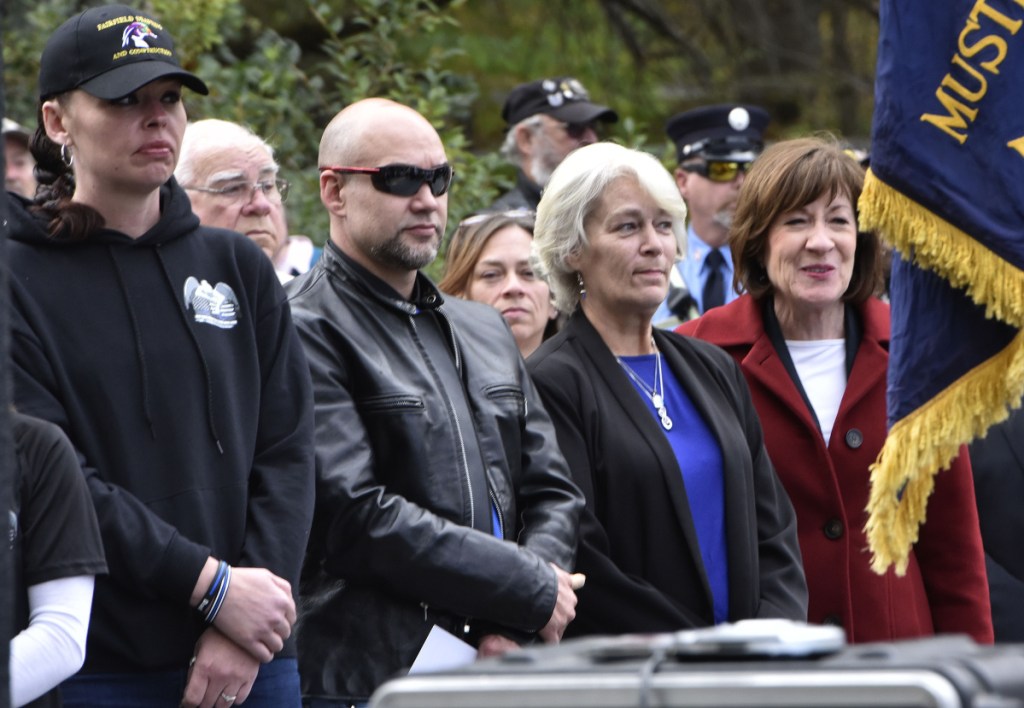NORRIDGEWOCK — U.S. Senator Susan Collins said Sunday that she’s been hearing “very positive” feedback from Mainers regarding her vote the day before to confirm now-Supreme Court Justice Brett Kavanaugh.
Despite that positive feedback, Collins’ office said later on Sunday that she’s been receiving enhanced security measures for weeks.
That enhanced security will continue “for the foreseeable future,” according to Collins’ Communications Director Annie Clark.
Collins was in Norridgewock on Sunday afternoon to give remarks at a bridge dedication for Somerset County Sheriff’s Cpl. Eugene Cole, who was shot and killed while on duty this spring. Maine’s senior senator encouraged reporters not to ignore the bridge dedication, but spoke with reporters about her vote for roughly five minutes after the ceremony.
“I’ve had, obviously, protesters again at my house this morning before coming here, but it has been overwhelmingly positive — as I think you could tell by the reaction of the people who are here for this important ceremony today,” Collins said. “So that’s been very heartening.”
Earlier in the day, she received a round of applause when State Rep. Brad Farrin, a Republican from Norridgewock, introduced here as someone “known to be thorough, compassionate, and to lead with civility.”
“I have to tell you, it’s really wonderful to be back home in Maine,” Collins said at the outset of her remarks, a likely allusion to the flurry of attention and — according to her office, threats — directed her way.
“Due to multiple serious threats, we began providing enhanced security measures for Senator Collins and her offices three weeks ago,” Clark said in a written statement. “These measures have been recommended by the Senate Sergeant at Arms and the United States Capitol Police, who are working in coordination with the Maine State Police and local law enforcement. The Senator and her staff are grateful for their assistance, and we anticipate that these measures will be in place for the foreseeable future.”
Despite the increased security, Collins maintained that she’s received a positive response from Maine people since Saturday’s vote, which confirmed Kavanaugh as the country’s newest Supreme Court Justice amidst allegations that he committed sexual assault decades ago.
“Many people have thanked me for my vote, and have said that they were very pleased that I did the right thing, and that I applied the judgment that I did,” Collins added Sunday. She outlined her reasons for supporting Kavanaugh’s nomination in a more than 40-minute speech on the Senate floor Friday. She said Sunday that the additional interviews conducted by the FBI were the turning point in her decision to support the nomination.
“The turning point were the reports compiled, the interviews compiled by the FBI as part of its supplemental background investigation — an investigation that three of us pushed very hard for. That was Jeff Flake, Lisa Murkowski and myself,” Collins said. “We felt that it was important, even though we had a lot of sworn statements, that the FBI go and interview individuals who were named by Dr. Ford as allegedly being present at this party.”
Collins said on the Senate Floor that she found the testimony of Dr. Christine Blasey Ford, who told the Senate Judiciary Committee that Kavanaugh sexually assaulted her when they were teenagers, to be “sincere, painful, and compelling.” Kavanugh has strongly denied the allegations.
Collins said Sunday she felt the additional investigation was particularly important “because I believe that Dr. Ford is a survivor of a sexual assault, and what I was trying to determine was whether Brett Kavanaugh was the person who committed that sexual assault.”
“The FBI interviews — and I read every single one of them personally on Thursday — were very helpful in my final decision because they produced no corroborating evidence,” she continued. “In fact, Dr. Ford’s best friend said in two separate interviews that she had no recollection of any night like that, and that she did not even know Brett Kavanaugh. So, it was reading those reports from the investigation that I pushed for, even though there had been six previous FBI background investigations of Judge Kavanaugh, that helped me make my final decision.”
Asked again about Ford’s allegations, Collins repeated her belief that Ford is a survivor of sexual assault but also referenced the principals of due process and the presumption of innocence.
“I believe she was the victim and a survivor of a sexual assault, and that the trauma has stayed with her her entire life,” Collins said of Ford. “We have a presumption of innocence in this country, and it’s a very important presumption. And we also believe in due process and fairness. And this allegation does not take away from the fact that I believe that Dr. Ford was, at some point, sexually assaulted and that that trauma has upended her life.”
Independent Sen. Angus King voted Saturday against confirming Kavanaugh. Other former and current politicians from Maine weighed in on the vote over the weekend, including former U.S. Sen. George Mitchell.
“If I were still a member of the U.S. Senate, I would not vote to confirm Judge Brett Kavanaugh to the Supreme Court,” Mitchell said in a statement Sunday. “Having served in the Senate when it considered the nomination of Clarence Thomas to the Supreme Court, I am keenly aware of how little we have progressed as a society in dealing with issues of sexual assault. In the current process, I found Dr. Ford’s testimony to be credible.”
Aside from the allegations of sexual assault, Mitchell said he didn’t think Kanaugh would be a good fit for the court.
“While I respect the view of the President, and all others on all sides of the issue, I share the view of a substantial majority of Americans who support a woman’s right to choose, as set forth in the Supreme Court decision in Roe v. Wade, subject to certain limitations. I am concerned that this confirmation directly threatens that right; a reversal of Roe v. Wade would create social unrest in this country, especially among women who would be denied what has been for more than a half century their constitutionally-protected right to choose.”
Collins on Sunday also addressed a question about the crowd funding effort that now raised over $3 million to fund a future opponent against her in 2020 should she seek reelection.
“First let me say that the crowd-funding effort was clearly in an attempt to intimidate me — and I don’t react well to that,” Collins said Sunday. “Just understand what the agreement was among those who’ve contributed. What was put out there is — if I voted no on Judge Kavanugh’s nomination, the money would be refunded to the donors. If I voted yes, the money would be given to my 2020 opponent. That is a clear quid pro quo, and arguably violates the bribery clause, or is an attempt at extortion.”
She added that she thinks “we are in a bad place in this country if people believe they can buy the vote of a United States Senator.”
She indicated that the effort did not affect her vote.
“So they have raised a great deal of money, but the political calculus does not enter in to my decision,” she said.
Matt Junker — 861-9253
Twitter: @mattjunker
Send questions/comments to the editors.





Comments are no longer available on this story